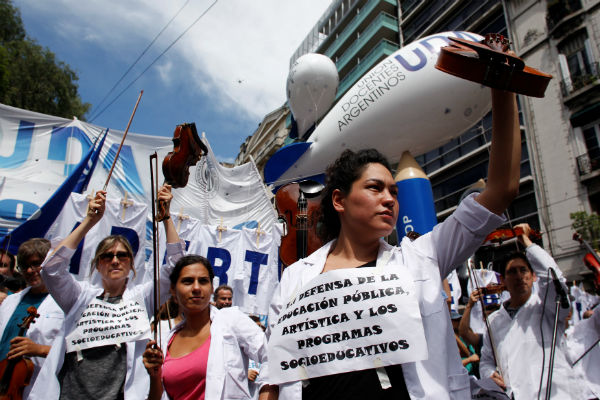Workers want wage increases after 40 per cent inflation in 2016

BUENOS AIRES (Reuters) — Thousands of teachers took to the streets of Buenos Aires on Monday, delaying the first day of school for millions of children, as part of a two-day national strike demanding a wage increase to compensate for sky-high inflation last year.
The strike poses a test for centre-right President Mauricio Macri's administration, which is increasingly clashing with the country's powerful unions ahead of legislative elections in October. Macri's coalition is banking on success in the midterm vote to continue its agenda of market-friendly reforms.
The outcome of Argentina's annual wage negotiations are closely watched by economists as salary hikes far above the central bank's target for 12-17 per cent inflation in 2017 could make it more difficult for the government to control inflation.
Monday's strike comes after unions and many provincial governments failed to reach salary agreements, with teachers demanding that wage hikes compensate for purchasing power lost in 2016, when inflation totaled around 40 per cent.
"The strike is massive across the whole country," Roberto Baradel, a Buenos Aires province teachers' union leader, said in an interview with local television channel Crónica.
Teachers in Argentina's largest province of Buenos Aires have demanded wage increases of 35 per cent for 2017, while Governor Maria Eugenia Vidal — a close Macri ally — has offered them an 18 per cent raise.
In a speech last month, central bank President Federico Sturzenegger said salary hikes "slightly above" the central bank's target would not compromise the monetary authority's ability to meet its target.
The bank workers' union, seen as a bellwether for the rest of the private sector, reached a deal with employers for a 24.3 per cent wage increase last month.
Unions are becoming more vocal in their opposition to some of Macri's pro-market policies. Since taking over in December 2015 after more than a decade of populist rule, Macri has allowed the peso currency to float, reduced subsidies and eliminated tariffs intended to promote domestic manufacturing.
A promised wave of investments has not yet arrived and the economy has struggled to rebound from a deep recession. On Tuesday, the country's largest union has planned another protest to demand higher salaries and demonstrate against layoffs.
"I greatly regret that they have chosen the opportunistic route of a strike," Macri said of the teachers while visiting a rural school in Argentina's northwestern Jujuy province.




